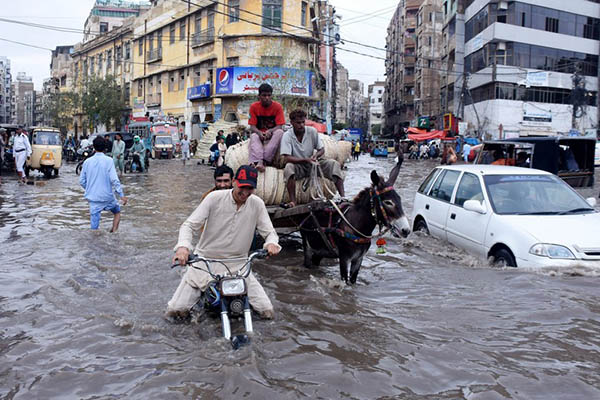
Flooding in Karachi after the recent bout of torrential rains. Twitter
Heavy monsoon rains across Pakistan over the past week have triggered flooding in both rural and urban areas, prompting Prime Minister Shehbaz Sharif to direct local authorities to monitor the situation in Sindh, Balochistan and south Punjab ahead of additional rainfall forecast by the Pakistan Meteorological Department (PMD).
According to the National Disaster Management Authority (NDMA), 147 people have died due to the ongoing monsoon season so far—77 of which had been announced by Climate Change Minister Sherry Rehman last week. Addressing a press conference, she described the deaths as a “national tragedy,” adding that hundreds of homes had also been destroyed, particularly in the remote regions of Balochistan and Sindh.
The NDMA said that 88 of the deaths were among women and children. It noted that the heavy rainfall, with reports suggesting some parts of the country have experienced nearly triple the average amount of rainfall for this time of year, had also damaged homes, roads, bridges and power stations.
Sindh capital Karachi experienced a particularly heavy deluge over Eidul Azha, with authorities reporting at least 10 deaths in the aftermath. The metropolis also reported large spells of power outages, as the rainfall inundated many areas of the city, including the upscale Defense Housing Authority (DHA) and Clifton. According to the PMD, Sindh and Balochistan are likely to experience another monsoon spell for the rest of the week, with expectations of heavy rainfall.
According to the Inter-Services Public Relations (ISPR), Chief of Army Staff Gen. Qamar Javed Bajwa has directed the Karachi Corps to ensure “every single resource is utilized to bring comfort to the people” impacted by the urban flooding. In a statement, the military’s media wing said that Gen. Bajwa had reached Karachi from Saudi Arabia and had done an aerial survey of the city’s situation. It said that the Army chief had been briefed on the flooding and the support provided to the city’s civil administration.
“Just spoke to [Sindh] C.M. Syed Murad Ali Shah,” P.M. Sharif said in a posting on Twitter. “Deeply saddened by the tragic losses due to torrential rains in Karachi. I am confident that the Sindh government will rise to the occasion and bring life back to normal under the able leadership of C.M. Sindh. Have offered to extend every possible support,” he added.
In a press conference on Monday, the provincial chief minister blamed “unprecedented record rainfall” for the flooding, saying this was beyond the city’s drainage system. “The city has witnessed an unprecedented record rainfall of 136 millimeters or five inches within 12 hours … after a brief break it started again,” he said. “Our storm water disposal system is not designed for such a heavy downpour,” he added.
In Khyber-Pakhtunkhwa province, authorities have stressed that the bulk of the flooding is restricted to rural areas, with citizen journalists reporting that entire villages have been inundated. At least six people have been killed, with 12 others injured, according to the Provincial Disaster Management Authority. It said that Swabi, Dera Ismail Khan, Tank, Nowshera and Malakand were the worst affected, adding that rescue and relief operations were under way.
Meanwhile, in Balochistan, six people died and dozens of houses collapsed over the weekend, with local residents saying remote areas had been cut off, making rescue efforts difficult, because roads in various districts have been entirely submerged due to the collapse of several small dams. Lasbela has reportedly suffered the worst of the disaster, with authorities saying more than 200 houses had been wiped out in a flash flood.
Local media also reported that five people had been reported dead in Gilgit-Baltistan on Monday, as many parts of the mountainous area remained inaccessible after flooding submerged roads and bridges. In a statement, the Gilgit-Baltistan government said it had initiated relief and rehabilitation operations, adding remote areas of Ghizer, Shigar, Skardu, Ghanche, Hunza, Nagar and Diamer districts were currently cut off, making it difficult to provide medical care and food supplies.
On Wednesday morning, Rawalpindi also reported urban flooding, with authorities vowing to ensure all water submerging roads had been pumped out on priority basis. WASA has warned of a heavy rain forecast for the next few days and urged local residents to exercise caution and avoid areas near natural rivers and nullahs.
